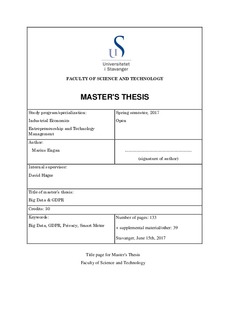| dc.contributor.advisor | Häger, David | |
| dc.contributor.author | Engan, Marius | |
| dc.date.accessioned | 2017-11-22T08:57:32Z | |
| dc.date.available | 2017-11-22T08:57:32Z | |
| dc.date.issued | 2017-06-15 | |
| dc.identifier.uri | http://hdl.handle.net/11250/2467489 | |
| dc.description | Master's thesis in Industral Economics | nb_NO |
| dc.description.abstract | The European Commission has implemented the General Data Protection Regulation (GDPR) which will replace the current, but obsolete, Data Protection Directive 95/46/EC. When legally effective, May 25th 2018, it will impose a much stricter regime and sanctions which magnitude may force bankruptcy.
It increases dramatically the scope of what is considered personal data while restricting the processing as such. Thus, curtailing businesses’ opportunity to drive value through big data analytics. In an increasingly data-driven economy, where data is drawn in the same breath as competitive advantage, it may seem like the candle is burned at both ends. Pursuant to the issue a question arises to whether the value of data will diminish. Consequently, this work researches how the GDPR will impact the value of data, with an emphasis on value driven trough the big data value chain.
The research is carried out in three phase: A preliminary analysis that identifies a set of value drivers; a primary analysis that identifies influences from the GDPR on said value drivers; and a case study on smart meter data. The results are presented as five assertions which make up the foundation of a discussion.
The research finds that the short-term impact raises concern to limitations put on: realizing value in public interest; harnessing the power of algorithms in automated decision-making; and discovery of new knowledge through data mining. However, the positive long-term impact are expected to overshadow the negatives and to ensure a sustainable data-economy in the future.
The research concerns a legislation that is yet to be enforced. The results are therefore predictions rather than hard facts, but will serve as insight to possible future challenges. | nb_NO |
| dc.language.iso | eng | nb_NO |
| dc.publisher | University of Stavanger, Norway | nb_NO |
| dc.relation.ispartofseries | Masteroppgave/UIS-TN-IØRP/2017; | |
| dc.rights | Navngivelse 4.0 Internasjonal | * |
| dc.rights.uri | http://creativecommons.org/licenses/by/4.0/deed.no | * |
| dc.subject | GDPR | nb_NO |
| dc.subject | industriell økonomi | nb_NO |
| dc.subject | big data | nb_NO |
| dc.subject | privacy | nb_NO |
| dc.subject | smart meter | nb_NO |
| dc.subject | personvern | nb_NO |
| dc.title | Big Data and GDPR | nb_NO |
| dc.type | Master thesis | nb_NO |
| dc.description.version | submittedVersion | nb_NO |
| dc.subject.nsi | VDP::Teknologi: 500 | nb_NO |

